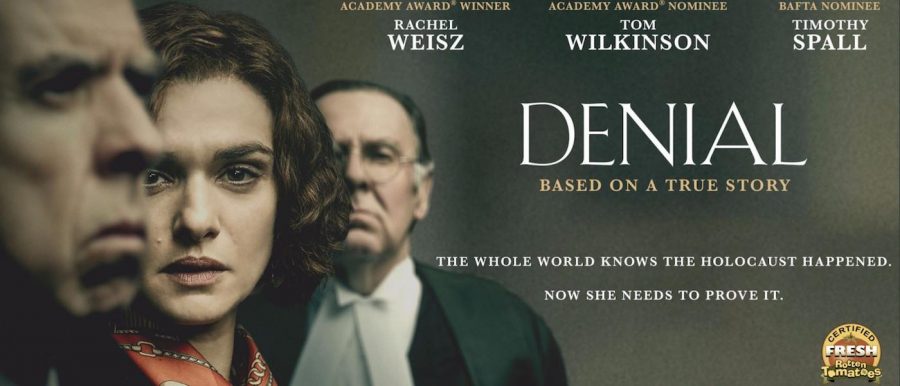Denial is a minimally fictionalized account of the 2000 London court case, David Irving v. Penguin Books Ltd and Deborah Lipstadt. Based on Deborah Lipstadt’s book, History on Trial: My Day in Court with a Holocaust Denier, this film tells the story of the libel case that notorious Holocaust denier brought on Emory professor Deborah Lipstadt.
Conflict between the opposing sides is portrayed even before Lipstadt has been served with Irving’s case. In an abrasive screaming match between the professor and the now discredited historian, Timothy Spall’s impressive performance as Irving guides the audience towards a negative opinion of the denier. Spall’s obnoxious jeers and pretentious facial expressions accurately portray Irving’s character and begin the film with a bang, thus preparing the audience for the escalating tensions to come.
Likewise, Rachel Weisz gives an impressive performance as the wonderfully stubborn Deborah Lipstadt. From the beginning of the film, as she holds command of her classroom, one can tell from Weisz’s affect that Lipstadt is a no-nonsense woman who will settle for nothing less than what she wants. Weisz continues to accurately display this leading characteristic throughout the film as Lipstadt fights with her legal team and struggles to let the case be run sans her input.
One weakness of Denial, was that although the legal team mentioned that their research would take approximately one year to complete, little to no researching was shown on screen. This case is unique through the American lens as the burden of proof in the case, because it was held in a British court of law, was on Lipstadt and her team as opposed to Irving. Because this is an interesting aspect of the libel case, the extensive, lengthy research process should have been displayed; there was little to no sense of time in the movie.
Denial did, however, show one aspect of the never-ending research: Auschwitz. Opposing the horrific memories of the atrocities committed at Auschwitz, the cinematography of these harrowing scenes was oddly beautiful. Solemn shots of barbed wire fences, collapsed crematoriums, and barracks in the winter cast an appropriate tone on the scene and paid due respect to those who suffered within the perimeter.
Furthermore, the score, unlike in other movies, was noticeably effective in emphasizing mood or inciting suspense or sadness in the audience.
Denial hit its high point when it came time for the verdict. Although many already knew the outcome of the polarizing case when they entered the theater, the dialogue and the score of the judgement scenes would leave anyone on the edge of their seat.
Overall, Denial factually recreates (the dialogue in the court scenes is taken straight from the real transcript) an intriguing and disturbing case while keeping the storyline exciting and suspenseful.
– Ali Hurst – Assistant Castoff Editor –



















